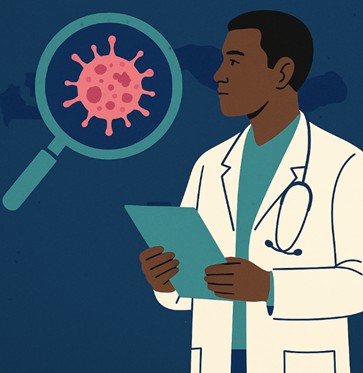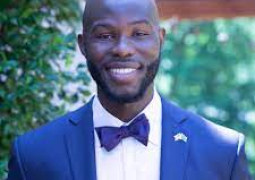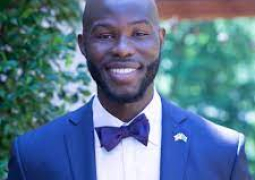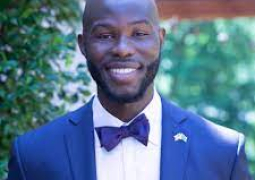
A Nation at a Turning Point
As September’s focus on prostate cancer gives way to October’s “Pink October” breast cancer campaign, The Gambia stands at a critical point in its fight against cancer. This is not just a shift in the calendar. It is a reminder that our battle against cancer must be year-round, a continuous commitment to health, early detection, and saving lives.
For decades, cancer has been whispered about in Gambian homes—something people feared, misunderstood, or avoided talking about. Too many saw it as a death sentence. But today, we have reason to believe, and more importantly, to act.
Understanding the Numbers: The Gambia’s Cancer Reality
According to the Global Cancer Observatory (2022), The Gambia recorded 1,196 new cancer cases and 899 deaths in a single year.
- For women, cervical cancer leads the way, making up 48% of all diagnoses, followed by breast cancer at 15%.
- For men, liver cancer is the biggest challenge, responsible for 41% of male cases, followed by lung and prostate cancer.
These figures may seem overwhelming, but each number represents a person—a father, mother, brother, or sister. Behind every statistic is a family, a story, and an opportunity for us to change the outcome.
From Fear to Hope
For too long, fear has delayed action. Many Gambians wait until it is too late, going to the hospital only when cancer has advanced to a dangerous stage. This is where stigma kills: “What you don’t know can’t hurt you” has cost us too many lives.
The truth is simple: when caught early, cancer can often be treated successfully. Survival rates improve dramatically with early diagnosis. And here at home, The Gambia has made big strides.
At the Edward Francis Small Teaching Hospital and other centers, doctors like Dr. Lamin B.A. Jaiteh, our own surgical oncologist, are leading the way with cancer care. Screening services are now available and affordable compared to most of West Africa.
Cancer is no longer an automatic death sentence.
What Causes Cancer – And What We Can Control
Cancer happens when cells in the body grow out of control. While we cannot change certain things—like age or family history—we can influence many of the biggest risks:
- Tobacco use – smoking and chewing tobacco are linked to lung, liver, and many other cancers.
- Excessive alcohol use – a major driver of liver cancer.
- Unhealthy diet and obesity – poor food choices and lack of exercise increase risks.
- Unsafe sex practices – Human Papillomavirus (HPV) spreads easily and causes most cervical cancers.
- Chronic infections – Hepatitis B and C lead to liver cancer.
- Environmental exposure – certain chemicals and toxins can trigger cancer.
The key message is: we have power. The choices we make every day—whether it’s quitting smoking, choosing healthier foods, getting vaccinated, or going for screenings—can reduce our risks and save lives.
The Game Changers: Vaccination and Prevention
We now have powerful tools to prevent the cancers most common in The Gambia.
- Hepatitis B Vaccine – Since liver cancer is the second most common cancer overall (and the number one cancer in men), Hepatitis B vaccination is essential. It is available in The Gambia and protects strongly against the virus that causes most liver cancers.
- HPV Vaccine – With cervical cancer responsible for nearly half of female cancer cases, HPV vaccination is revolutionary. Given ideally to young girls before their first sexual experience, it can prevent most cervical cancers.
Every Gambian family should see these vaccines not as optional, but as life-saving investments.
Breaking the Silence: Screening Together
One of the biggest barriers is silence. Too many people hide symptoms, skip screenings, or delay care out of shame or fear. It is time to change this.
Health must be a family affair. Imagine the difference if:
- Husbands accompany wives for breast or cervical screening.
- Wives encourage husbands to check their prostate and liver health.
- Parents talk openly with children about vaccination and healthy lifestyles.
This kind of openness removes stigma and saves lives. Screening is not a sign of weakness; it is a sign of love and responsibility.
October’s Call to Action
This month, here’s what each of us can do:
For Men
- If you’re 40 or older (or younger with risk factors), get a PSA test for prostate cancer.
- Get vaccinated against Hepatitis B.
- Make liver function tests part of your annual health check.
- Support the women in your life—encourage and accompany them for their screenings.
For Women
- Schedule breast cancer screening—through clinical exams and mammograms if available.
- Get screened for cervical cancer with Pap smears or HPV testing.
- Get the HPV vaccine, and ensure your daughters are vaccinated.
- Perform monthly self-breast exams and report any changes immediately.
For Families
- Make October a family health month.
- Attend free community screening days together.
- Keep a family health history so risks are clear.
- Encourage open conversations about cancer and health.
Community Events You Shouldn’t Miss
This October, Gambians have multiple opportunities for free screening, education, and community action:
- Solace Foundation Fundraising & Awareness Day
October 18th, 2025
Serrekunda East Mini Stadium
Football and volleyball, free screenings, health talks, and fundraising. - Breast Screening Days (Edward Francis Small Teaching Hospital)
October 25th & 26th, 2025
Dedicated breast exams for women across Greater Banjul. - Free Breast & Cervical Screening in Gunjur
October 25th, 2025
Gunjur Health Centre
Bringing vital services to rural communities.
All screenings are free of charge—removing financial barriers to care.
Why Early Detection Saves More Than Lives
Catching cancer early not only improves survival but also saves families from crushing financial burdens.
Treating late-stage cancer is more expensive, more painful, and less effective. Early treatment is cheaper, simpler, and more successful.
For families, it means children keep parents, breadwinners stay productive, and savings are preserved. For the nation, it means a healthier workforce and reduced strain on our healthcare system.
A Message of Hope
Cancer is real, but so is our ability to fight it. About 8% of Gambians will face cancer before the age of 75, and 6% will die from it. But these numbers can be improved dramatically with prevention, vaccination, and early detection.
We have the doctors. We have the tools. We have the community spirit. What we need now is the will.
Beyond Awareness: The First Principles of Health
At Innovarx, we often speak of First Principles Thinking—the practice of going back to undeniable truths. In healthcare, the truths are clear:
- Every human body must be maintained.
- Illness is inevitable.
- Access and continuity determine outcomes.
- Trust and dignity are non-negotiable.
If we hold to these principles, then our path forward is undeniable. Early detection is not just a recommendation; it is the foundation of survival. Continuity of care is not optional; it is the difference between life and death.
The Call to Every Gambian
So many of our health challenges, from cancer to hypertension to diabetes, come down to a single principle: early detection. This is where we, the people, hold our destiny in our own hands.
One can argue that The Gambia actually has one of the most accessible health systems in the region—clinics, hospitals, and basic services are within reach. Our greatest limitation is not infrastructure, but our health-seeking behavior. We wait too long. We avoid tests. We let fear and stigma delay action until it is too late.
The future of health in The Gambia will not be determined by international aid, new hospital buildings, or imported technologies. It will be determined by whether Gambians choose to act early, to demand screenings, to use the vaccines available, and to hold themselves and their families accountable to the principle of early detection.
This is our turning point. We control our destiny. And together, with courage, knowledge, and the will to act, The Gambia can lead Africa in showing that dignity and survival are within reach when we honor the First Principles of health.
In peace, love, and good health,
Dr. Ismail D. Badjie, PharmD
For more info on screenings, support services, or to volunteer in cancer awareness programs, contact your nearest health facility or the Solace Foundation.
Follow Innovarx WOW Health Services at www.igh.gm or @innovarxglobal on social media.
Phone: +220 2866200
In peace, love, and good health,
Dr. IDB.
For more information about cancer screening locations, support services, or to volunteer with cancer awareness initiatives, contact your nearest health facility or the Solace Foundation. For more information, follow the work of Dr. Badjie and his Innovarx WOW team on www.igh.gm and on social media @innovarxglobal or call +2866200.
Disclaimer: The information provided in this article is for general understanding and does not constitute a diagnosis. For specific concerns or detailed health advice, always consult your designated healthcare professional.
Sources
- Ferlay J, Ervik M, Lam F, Laversanne M, Colombet M, Mery L, Piñeros M, Znaor A, Soerjomataram I, Bray F (2024). Global Cancer Observatory: Cancer Today. Lyon, France: International Agency for Research on Cancer. Available from: https://gco.iarc.who.int/today
- Sung H, Ferlay J, Siegel RL, Laversanne M, Soerjomataram I, Jemal A, Bray F. Global cancer statistics 2020: GLOBOCAN estimates of incidence and mortality worldwide for 36 cancers in 185 countries. CA Cancer J Clin. 2021 Feb 4. doi: 10.3322/caac.21660.
- Ferlay J, Colombet M, Soerjomataram I, Parkin DM, Piñeros M, Znaor A, Bray F. Cancer statistics for the year 2020: An overview. Int J Cancer. 2021 Apr 5. doi: 10.1002/ijc.33588.
- World Health Organization. Guide to cancer early diagnosis. Geneva: World Health Organization; 2017.
- World Health Organization. WHO position paper on hepatitis B vaccines. Weekly Epidemiological Record. 2017; 92(27):369-392.
- World Health Organization. Human papillomavirus vaccines: WHO position paper. Weekly Epidemiological Record. 2022; 97(50):645-672.
- Ministry of Health, The Gambia. National Cancer Control Strategic Plan 2020-2025.
- International Agency for Research on Cancer. GLOBOCAN 2022: The Gambia Fact Sheet. Available at: https://gco.iarc.who.int
- American Cancer Society. Cancer Prevention & Early Detection Facts & Figures 2023-2024.
- Solace Foundation, The Gambia. Breast Cancer Awareness and Fundraising Initiative. October 2025.
Read Other Articles In Health





